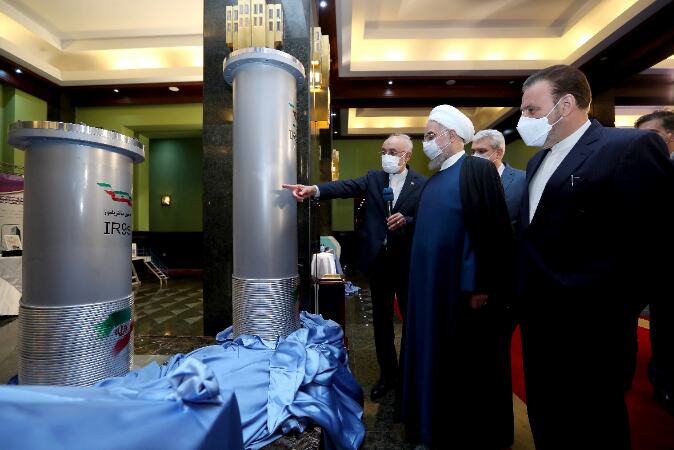Resolution or escalation?

Amid heightened regional tensions, Iran must cautiously approach Vienna talks with an aim to dilute sanctions while keeping its security and sovereignty intact
Iran seems to have raised its stakes at the ongoing negotiations in Vienna with world powers on reviving the 2015 nuclear deal and lifting of crushing economic sanctions it faces. It has started 60 per cent uranium enrichment at its Natanz nuclear facility, days after an explosion at the site that it blamed on its arch-rival, Israel.
This is the highest level of enrichment that Iran has ever done. The move has brought the country a step closer to the 90 per cent needed for a nuclear bomb, something it says it is not seeking. The move is likely to raise tension in the region and could mark a significant escalation after the attack that damaged an unknown number of centrifuges – sophisticated machines that make uranium usable for nuclear purposes at Natanz.
Iran, which has maintained that its nuclear programme is peaceful and it does not aim to build an atomic bomb, says its decision to enrich 60 per cent uranium is for medical use. Under the 2015 deal, from which the former US President Donald Trump walked out in 2018, Iran is allowed to keep up to 300 kg of uranium enriched to 3.67 per cent.
The new US administration under President Joe Biden is willing to go back to the accord and lift nuclear-related sanctions only when Iran returns to the strict limits set out for its nuclear activities under the deal.
Iran says that it will only abide by the agreement once the US has verifiably lifted all sanctions. More than 1,500 sanctions were imposed on Iran after President Trump withdrew from the deal. Many of them relate to Iran's nuclear activities. Some sanctions relate to Iran's development and testing of ballistic missiles, support to militias in neighbouring countries, and for alleged terrorist activities and human rights violations.
Iran maintains that most of the US sanctions under different headings are effectively nuclear-related and should be removed. In the past two years, Iran has developed, tested and installed new and advanced centrifuges that have altered the limits set under the nuclear deal.
Israel is opposed to the lifting of any sanction against Iran. Israel's Prime Minister Benjamin Netanyahu has said that Iran's return to the 2015 nuclear deal is an existential threat to his country and had supported President Donald Trump's decision to withdraw from it.
Israel is not the only country in the region that is worried about Iran's nuclear activities as well as its approach towards the region. Israel has not yet reacted to the Iranian charge that it was behind the attack on the nuclear facility. Netanyahu has pledged never to allow Iran to obtain a nuclear weapon. The attack earlier this month took place one day after Iran launched what was described as advanced centrifuges to enrich uranium at the plant coinciding with the country's National Nuclear Technology Day.
Prime Minister Netanyahu has pledged never to allow Tehran to obtain a nuclear weapon and his country has twice preemptively bombed Middle East nations to stop their atomic programmes. Any move by Iran could inspire a further response from Israel in the shadow war between the two countries. The timing of the attack on the facility is intriguing. It took place as the US Secretary of Defence Lloyd Austin landed in Israel on the first visit by a senior member of the Biden administration. Countries have a right to defend themselves, but outright attacks on sovereign infrastructure and their potential for hugely dangerous consequences could lead to further escalation. Caution must be a guiding principle as tensions rise.
The talks in Vienna are aimed at bringing Iran and the US back into compliance with the 2015 deal that would effectively mean a halt to Iran's march towards advanced nuclear capability and lifting of the US sanctions that have crippled the Iranian economy badly affecting nearly 85 million people in the country.
The talks are being held between the US and Iran indirectly; with Britain, France, Germany, Russia and China acting as conduits under the chairmanship of the EU. The Iranian delegation has been strictly told by the Supreme Leader Ayatollah Ali Khamenei not to talk to the US face-to-face.
Ahead of the talks, President Hassan Rouhani categorically said that ending the US sanctions against Iran would be a top priority during his remaining tenure in office. Presidential elections are due on June 18 and Rouhani would hand over the power to the new government on or around the first week of August.
Perceived as a pragmatist, Rouhani recently warned that hardline opponents are obstructing efforts to lift the biting US sanctions. There is speculation in the Western world that Rouhani may be replaced by a hardliner who is handpicked by Khameini.
Moderating Iran's nuclear ambitions is the primary goal of Western countries at the Vienna negotiations. Partners in the region are keen to see that the talks succeed. At the same time, they want a more comprehensive approach taking into account what they call Iran's destabilising policies like its ballistic missile programmes and expansion of its proxy network in the region.
Iran must approach the talk in a way that would lead to the easing of sanctions while ensuring the security and sovereignty of the country.
The writer is a former Editor of PTI and served as the West Asia correspondent for the same. Views expressed are personal



